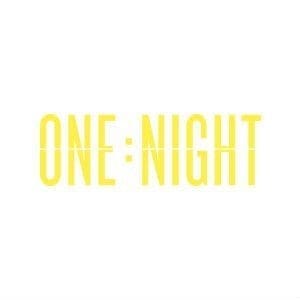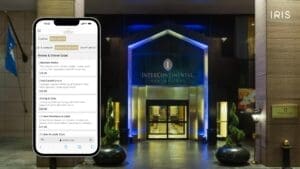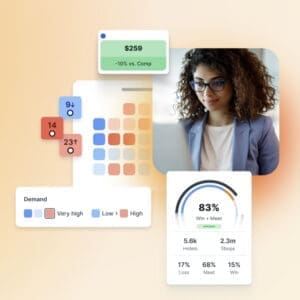 The typical housekeeping day starts with a group of people gathering in properties basement putting together schedules of rooms, printing out all those papers and putting them on clipboards. (It’s gotten slightly better because as people start going with some technology, they’re at least putting it on devices). Either way, it’s a massive series of events and by the time they’ve got the schedules prepped and printed – be it for whatever reason, they’re often already outdated. Then you hand the clipboards to the team, they get their keys and their off. They’re untethered, nobody knows where they are.
The typical housekeeping day starts with a group of people gathering in properties basement putting together schedules of rooms, printing out all those papers and putting them on clipboards. (It’s gotten slightly better because as people start going with some technology, they’re at least putting it on devices). Either way, it’s a massive series of events and by the time they’ve got the schedules prepped and printed – be it for whatever reason, they’re often already outdated. Then you hand the clipboards to the team, they get their keys and their off. They’re untethered, nobody knows where they are.
Out in the wild
Let’s say for example, you’re at a property like MGM Grand at Las Vegas – that’s 500 room attendants and another 50 supervisors. Those 50 supervisors will probably have a radio, but those RAs? They’ll be doing their own thing.
They have their marching orders, but it is the most interrupt-driven environment in the world. They might get to their first door and there’s a “Do Not Disturb” on it. Nobody in the house knows this – but the RA knows it, and they go down the hall and there’s another and another and so on. They then have to go and they find a room to clean and there’s nobody managing the order in which they revisit them all.
The lines of communication
Then of course there is also the situation where you get a guest arriving early and they want a room. The staff member will go ahead and make the call to check the status of the room – and they contact housekeeping. Housekeeping then radios someone on the floor, who then runs around to try and find a housekeeper to go over and clean that room.
Meanwhile front of house is telling the guest, “If you give me 10 minutes, let me check on it…it’s just about ready” (It’s not really.) Somebody is pulling somebody from somewhere else, interrupting….
It’s all human based – you’re calling people to chase people, to call more people, to move things – there’s no tracking, there’s no audit, no quality assurance. It’s just go.
An Enterprise Resource Planning issue
It’s a big issue. What Optii Keeper allows people to do is say, “Fine, come the morning I’ve got your rosters loaded and I know what the work arrangements are. I now know in real time at 7.30am what to clean.”
It allows staff to confirm their roster for the day via predefined rostering, but it also allows them to move or delete people if they’re not coming in or they’re in late. Then they push “go” on the scheduling and assign the cleaners.
You can’t manage what you can’t measure
In the hotel industry, it’s been difficult to work out how to measure the level of effort it takes to clean a room. So we said we’ll call a regular room, “1 Credit”. For example, 1 Credit equals 40 minutes. You get time in-between rooms and time to get towels and so on, but you’ve got to do 14 credits in one business day.
But rooms aren’t rooms, and guests aren’t guests.
For example, take a standard room with a German business person coming in for one night. That might be a 15 or 30-minute clean. That same room with a family of 4 from France who are going to go to Disneyland? It could be an hour or more.
So we built an element into the product that actually predicts the time required to clean, establishing baselines for each hotel. We learn over time what occurs based on country of origin, marketing code, length of stay, number of people in the room and a range of other factors. It learns and continually optimises, so that when a schedule is generated, it’s highly optimised.
We also determine the shortest path from one room to the next to minimise travel time. Plus, it’s colour-coded, so for example, orange rooms are departure cleans. You can order departure cleans first and get your rooms available for incoming guests – or you can do it on time to get efficiency. If you have a light house that night, order doesn’t necessarily matter as much, but minimising your team requirements will minimise wages for the day.
This by itself – this optimised schedule – is knocking 10, 15, as much as 25% off housekeeping costs. We consider real time, labour management that analyses level of effort, rather than volume of rooms. In essence, you can’t manage what you can’t measure.
About Opti
Optii Solutions is a rapidly growing company focused exclusively on optimizing the housekeeping function in hotels. Founded by hospitality professionals in 2006, Optii Solutions recognized the need for an improved approach to housekeeping – particularly where our clients are located in countries where labor is expensive or scarce. Our solutions represent the first innovation in housekeeping in decades. Our clients helped us to shape our applications, and they continue to be involved in the design and refinement of our solutions.
Integrating seamlessly with your other operational software, our focus continues to be on enabling you to optimize your housekeeping and achieve real, measurable improvements. Our portfolio includes Shangri-La, Ritz-Carlton, Las Vegas Sands, the InterContinental Hotel Group and our technology plays a key role in our clients’ operations around the world.
Headquartered in Las Vegas, USA, Optii Solutions has offices in Australia, Hong Kong and Europe.















